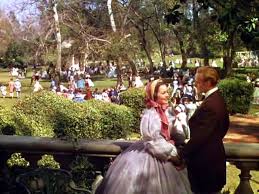Scarlett O’Hara’s first encounter with Rhett Butler is an April picnic at the Wilkes family’s Twelve Oaks plantation. It’s only days before the Civil War begins in Charleston, South Carolina (April 12, 1861), and the picnickers are oblivious to the rush to war. It’s the engagement of Ashley Wilkes and Melanie Hamilton that matters.
Often overlooked, Mitchell describes two picnics happening simultaneously, one among the plantation aristocrats in the garden, and a second, out of sight among the enslaved African Americans in the work area behind the barns. It’s an accurate example of Southern social veneer smoothing over slavery. But it is unclear what Mitchell’s intentions are for showing dichotomy.
Mitchell’s description of the Wilkes’ picnic is graphic: “The long trestle picnic tables, covered with the finest of the Wilkes’s’ linen, always stood under the thickest shade, with backless benches on either side; and chairs, hassocks, and cushions from the house were scattered about the glade for those who did not fancy the benches. At a distance great enough to keep the smoke away from the Wilkes’ guests, the meats cooking over long pits and the huge iron wash-pots from which the succulent odors of barbecue sauce and Brunswick stew floated. Mr. Wilkes always had at least a dozen darkies busy running back and forth with trays to serve the guests.”
The African Americans’ picnic is discreetly hidden behind the barns where their barbecue pit is situated. House servants, maids, and coachmen feast on hoecakes, yams, and chitterlings. But what cannot be hidden are the smells of cooking. Mitchell’s description of the scene crackles with the aromas of barbecue. “As the smell of crisp fresh pork came to her, Scarlett wrinkled her nose appreciatively, hoping that by the time it was cooked, she would feel some appetite.” Of course, everyone smells the crisp fresh pork—and no one remarks about who makes it and how it is served. Beverages are not mentioned.
Mitchell was neither inventing this tradition of the plantation nor was she exaggerating the picnic and its proximity to war. There was ample evidence, and Mitchell probably mined Mary Boykin Chesnut’s A Diary from Dixie (1905) for Gone with the Wind. Chesnut provides evidence that the Mulberry Plantation picnic was celebrated just after the war began. * Chesnut was the wife of a former United States Senator and aide to Jefferson Davis and lived in Richmond throughout the war. Her Diary is literal, permeated with Confederate idealism. The months after the war began, Chesnut attended a “charming picnic at Mulberry plantation where she remembers, “Everything was promising – the most perfect of days and the old place in great beauty. Those large rooms were delightful for dancing; we had as good a dinner as mortal appetite could crave; the best fish, fowl, and game; wine from a cellar that can not be excelled. Despite a blockade, Mulberry does the honors nobly yet. Mrs. Edward Stockton drove down with me. She helped me with her taste and tact in arranging things. We had no trouble, however. All the old servants who have not been moved to Bloomsbury scented the prey from afar, and they literally flocked in and made themselves useful.”
Featured Image: Scarlett O’Hara holds court. Fleming’s Gone With the Wind (1939)
See Margaret Mitchell. Gone with the Wind. Gone with the Wind. New York: Macmillan Company, 1936; http://gutenberg.net.au/ebooks02/0200161.txt; Mary Boykin Chesnut’s Diary at http://docsouth.unc.edu/southlit/chesnut/maryches.htmlText; For Brunswick Stew, see Marion Harland’s Common Sense in the Household (1871); for Pig barbecue, see Martha McCulloch-Williams’ Dishes and Beverages of the Old South (1913)
*The screenplay by Sidney Howard and others omits the screenplay for Gone With the Wind (1939) captures the Wilkes’ garden party’s gaiety but omits the African American’s barbecue.

